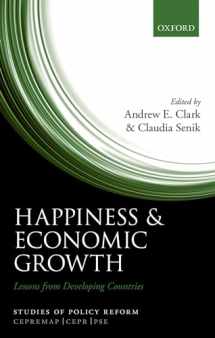
Happiness and Economic Growth: Lessons from Developing Countries (Studies of Policy Reform)
ISBN-13:
9780198723653
ISBN-10:
0198723652
Edition:
1
Author:
Andrew Clark, Claudia Senik
Publication date:
2015
Publisher:
Oxford University Press
Format:
Hardcover
240 pages
FREE US shipping
Book details
ISBN-13:
9780198723653
ISBN-10:
0198723652
Edition:
1
Author:
Andrew Clark, Claudia Senik
Publication date:
2015
Publisher:
Oxford University Press
Format:
Hardcover
240 pages
Summary
Happiness and Economic Growth: Lessons from Developing Countries (Studies of Policy Reform) (ISBN-13: 9780198723653 and ISBN-10: 0198723652), written by authors
Andrew Clark, Claudia Senik, was published by Oxford University Press in 2015.
With an overall rating of 4.4 stars, it's a notable title among other
books. You can easily purchase or rent Happiness and Economic Growth: Lessons from Developing Countries (Studies of Policy Reform) (Hardcover) from BooksRun,
along with many other new and used
books
and textbooks.
And, if you're looking to sell your copy, our current buyback offer is $0.56.
Description
This volume, arising from a PSE-CEPREMAP-DIMeco conference, includes contributions by the some of the best-known researchers in happiness economics and development economics, including Richard Easterlin, who gave his name to the 'Easterlin paradox' that GDP growth does not improve happiness over the long run. Many chapters underline the difficulty of increasing well-being in developing countries, including China, even in the presence of sustained income growth. This is notably due to the importance of income comparisons to others, adaptation (so that we get used to higher income), and the growing inequality of income. In particular, rank in the local income distribution is shown to be important, creating a beggar-thy-neighbour effect in happiness. Wealth comparisons in China are exacerbated by the gender imbalance, as the competition for brides creates a striking phenomenon of conspicuous consumption on the housing market. Policy has to be aware of these effects. This applies in particular to those who try to use self-reported subjective well-being in order to generate a 'social subjective poverty line', which is a key issue in developing countries. However, the news is not only bad from the point of view of developing countries. One piece of good news is that GDP growth often seems to go hand-in-hand with lower happiness inequality, and thereby reduces the risk of extreme unhappiness.


We would LOVE it if you could help us and other readers by reviewing the book
Book review

Congratulations! We have received your book review.
{user}
{createdAt}
by {truncated_author}


